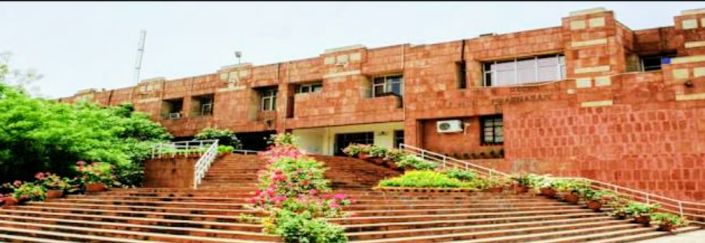NEW DELHI: Amid the ongoing COVID-19 pandemic, Jawaharlal Nehru University has conducted its first online e-learning workshop organized by Special Centre for E-Learning (SCEL) titled, “Design, Development & Delivery of Online Courses” with an aim to highlight the significance of E-learning in the times of pandemic.
As there is a need to broaden the platform of education in order to restore academics, technology has been helping the teachers to reach out to students from different parts of the country, especially during the ongoing crisis.
The online workshop was started with Welcomed Speech by Prof. Ravikesh, the chairperson of Special Centre for E-Learning, JNU followed by an inaugural address by the Vice-Chancellor of JNU, Prof. M. Jagadesh Kumar who has taken the initiative to foster E-learning programs so that quality education can be made accessible to students all across the country.

Eminent academicians like Prof. K.G Suresh, Former Director-general of IIMC, New Delhi, Prof. CB Sharma, former Chairman, NIOS, Prof. Girish Nath Jha, Professor of Computational Linguistics, JNU and Dr. Sheetal Sharma from JNU were in the panel of speakers.
Prof. Ravikesh in his welcome speech elaborated on the importance of E-learning and emphasized the fact that e-learning is going to develop further even in the post-COVID world and will become a new normal. He underlined the need to develop customized pedagogy for E-learning classes. He mentioned that the workshop will focus on both the theoretical and practical aspects of E-learning.
Vice-Chancellor, Prof. M. Jagadesh Kumar congratulated SCEL for taking the e-learning initiative and discussed the importance of training the teachers regarding E-learning classes through a series of webinars that JNU would conduct in the coming days.
While addressing the unprecedented challenges in academia amid the ongoing pandemic, Prof. M. Jagadesh Kumar discussed the significance of an E-learning Program that can render quality education beyond the classroom. Prof. Kumar said that developing an E-Learning program would lead to the “Democratization of Education” as it will benefit thousands of students across the country.
 He also expressed his concern regarding the present-day curriculum and the need to make it more globalized. He also talked about the importance of technology in academia and how it can help the students to access quality education from the best teachers of different Universities. He mentioned that the pandemic has helped academia to overcome classroom nostalgia as academicians have started acknowledging the importance of advanced learning.
He also expressed his concern regarding the present-day curriculum and the need to make it more globalized. He also talked about the importance of technology in academia and how it can help the students to access quality education from the best teachers of different Universities. He mentioned that the pandemic has helped academia to overcome classroom nostalgia as academicians have started acknowledging the importance of advanced learning.
Prof. C. B Sharma who has expertise in Open Distance Learning System and the role of Television and Multimedia in education discussed the importance of distance learning. While emphasizing on the significance of technology in education, he mentioned about the role of television and radio in educating rural India about the issues related to agriculture and family planning. He also mentioned that E-learning has resulted in a paradigm shift in academia. Prof. K.G Suresh who is an eminent journalist, communication specialist, and Dean of School of Mass Media, University of Petroleum and Energy Studies, Dehradun, emphasized the need for a “glocal” approach to foster E-learning in India.
Prof. Girish. N. Jha, Dean, School of Sanskrit and Indic Studies, JNU discussed the existing skepticism in digital education. He also discussed the challenges to cater to the linguistic diversity of India while developing the E-Learning program. Dr. Sheetal Sharma who has been a part of digital education in NCERT and SWAYAM discussed the nuances related to teaching techniques, mannerisms, and content of the online classes.
The workshop was attended by more than 800 teachers and researchers from different fields of academics including science, humanities, and media.
During the second day, the speakers Dr. Amerendra Behra, Assistant Director, CIET, NCERT addressed the gathering in which he elaborated on various significant aspects of Online teaching, its challenges, and opportunities.
The last presentation was made by Dr. Aerum Khan from Jamia Millia Islamia who presented on “Adapting to the Alternative Teaching Learning Strategies in online environment” in which she elaborated on the practical aspects of online learning and suggested various strategies and its effective implementation in online teaching.
The speakers addressed a large number of queries regarding the various aspects of the new way of learning and its future impact on society.
There were concerns raised related to the availability of resources, the physical absence of the teacher, and its impact on student’s psyche and digital divide on the basis of language. It was commonly agreed by the speakers that E-Learning is our necessity of the present time and it needs to be further discussed and developed to achieve the three cardinal principles of online education i.e. access, equity, and quality.
Prof. Ravikesh, Chairperson of Special Centre for E-Learning thanked all the participants for their keen interest and attending in large numbers, the members of the organizing committee: Dr. Sheetal Shrma, SIS, JNU for successfully coordinating the Sessions, Dr. Saurabh Sharma, Assistant Professor, SCSS, JNU; Dr. Satyanshu Srivastava, Assistant Professor, CKS, JNU, and Dr. Sanjay Kumar Jha, Assistant Professor, CKS, JNU.



